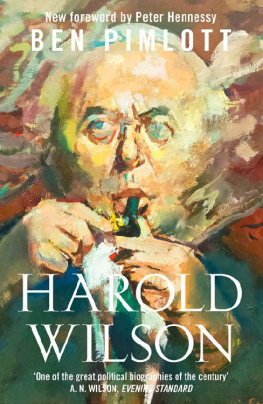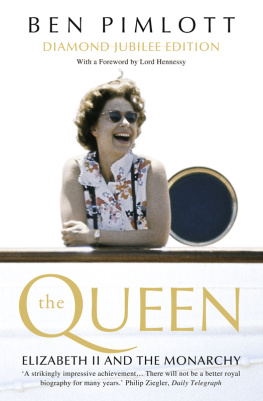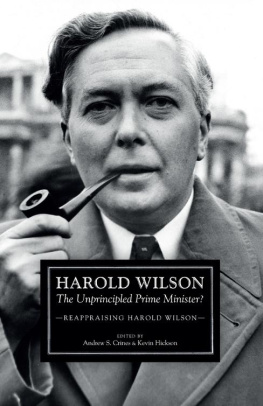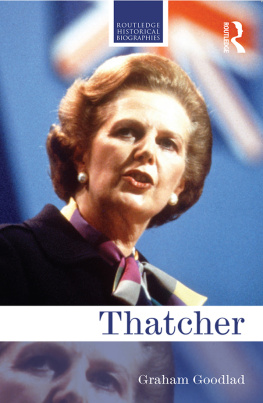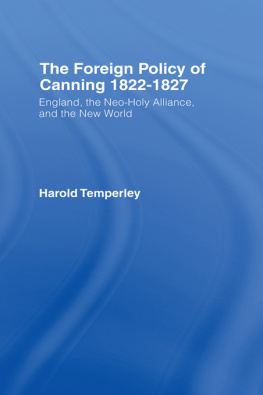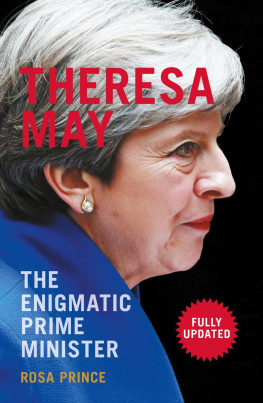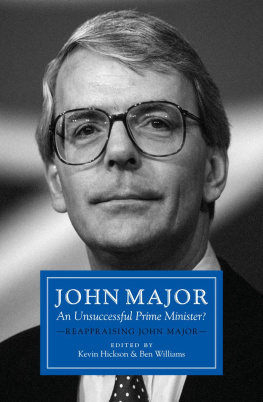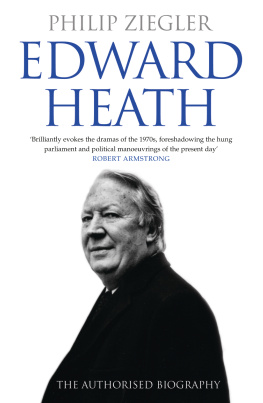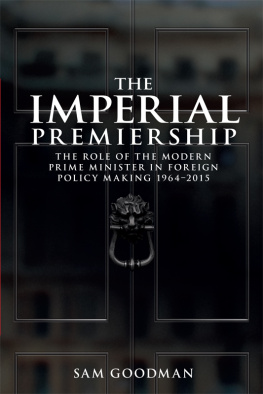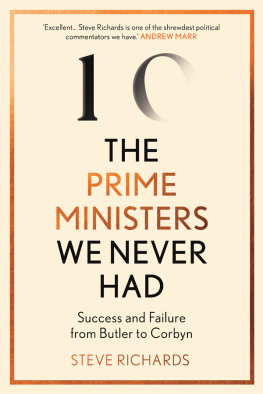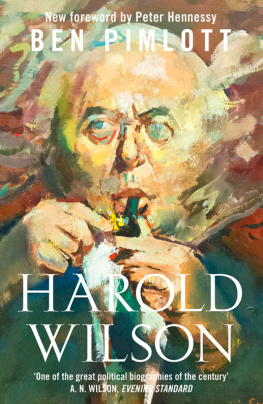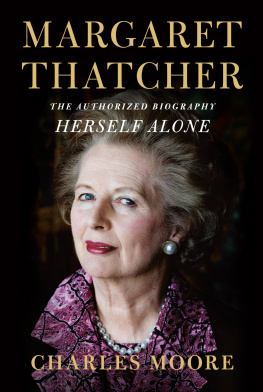BEN PIMLOTT
Harold Wilson

William Collins
An imprint of HarperCollins Publishers
1 London Bridge Street
London SE1 9GF
www.WilliamCollinsBooks.com
First published in Great Britain by HarperCollins in 1992
This edition first published by William Collins in 2016
Copyright Ben Pimlott 1992
Foreword copyright Peter Hennessy 2016
Ben Pimlott has the moral right to be identified as the author of this work.
A catalogue record for this book is available from the British Library.
Cover image: Harold Wilson, c. 1974 (oil on canvas), Spear, Ruskin (191190)/National Portrait Gallery, London, UK/ Stefano Baldini/Bridgeman Images
Illustrations: , Follow my Leadership (Garland) ( Telegraph plc).
All rights reserved under International and Pan-American Copyright Conventions. By payment of the required fees, you have been granted the non-exclusive, non-transferable right to access and read the text of this e-book on-screen. No part of this text may be reproduced, transmitted, down-loaded, decompiled, reverse engineered, or stored in or introduced into any information storage and retrieval system, in any form or by any means, whether electronic or mechanical, now known or hereinafter invented, without the express written permission of HarperCollins.
Source ISBN: 9780008182618
Ebook Edition March 2016 ISBN: 9780008182625
Version: 2016-03-10
FOR
DANIEL, NATHANIEL AND SETH
Contents
In the cycle to which we belong we can see only a fraction of the curve.
So wrote the statesman and novelist John Buchan of The Thirty-Nine Steps fame.
Harold Wilson dominated the political curve during my late adolescence and early manhood and, later, my first years as a journalist. To borrow Winston Churchills line on Joseph Chamberlain, Wilson made the political weather for the great bulk of his thirteen years as leader of the Labour Party between 1963 and 1976, during which he won four of the five general elections he contested and occupied 10 Downing Street from October 1964 to June 1970 and from March 1974 until April 1976.
The UK and its politics have travelled a huge arc on Buchans curve since Harold Wilson gave way to an older man, Jim Callaghan, as leader of the Labour Party and Prime Minister in the spring of 1976. Ben Pimlotts fine biography described that curve superbly up to 1992. It was an instant classic and has become an enduring one from one of Britains master biographers of the post-war years, and it is a great sadness to me that Ben is not here to update it to mark the centenary of Wilsons birth.
How do the politics and policies of the years of the Wilsonian ascendancy strike one now? Excessive hindsight can be a historical blight; but fresh perspectives shaped by elapsed time are a stimulating part of the historians tradecraft. For example, there are in the middle of the second decade of the twenty-first century plentiful resonances from all phases of the Wilson years, between his succeeding Hugh Gaitskell as Labour Party leader in 1963 and his final handing in of his seals of office to the Queen in 1976.
Merely to list some of them tells a story:
The internal condition of Labour; the tussles between its competing philosophies and factions; the partys relationships with the trade unions and constituency activists.
Europe and the referendum question; Britains place in the wider world; of punching heavier than its weight militarily and diplomatically, plus the deployment of soft power, with the often neuralgic sub-theme of The Bomb and remaining a nuclear weapons state always a lurking question.
Employment, productivity, the imbalance between finance, services and manufacturing; the states role in shaping an industrial strategy and sustaining the countrys scientific and technological base; plus the UKs thinking above its weight in terms of research and the universities.
This inventory is by no means complete, and how it would intrigue Wilson to revisit it as he absorbed the current scene through the clouds of his trademark pipe smoke were he still with us.
In his absence, let us linger on a few key Wilsonian themes. First, Labour Party management. Wilson was a supple and serpentine party manager. He was a quantum physicist among politicians in his understanding of what it took to keep its volatile subatomic particles together. For these gifts he was often derided dismissed as a tactician who would all too readily sacrifice long-term strategy to the imperative of the immediate and the pressing. But now, at a time when the Corbyn-led Labour Party is demonstrating fortissimo its most powerful centrifugal tendencies, to the detriment of its indispensable constitutional function of providing sustained and effective opposition to the government, Harold-the-party-manager seems positively lustrous a reminder that at least a semblance of party coherence is more often than not a first-order matter for Labour. The partys relations with the unions and the wider Labour movement are integral to this.
Wilson knew how to juggle with and arbitrate between the political philosophies that perpetually compete for the soul of the Labour Party: social democracy; democratic socialism; and a variety of hard-left factions. This skill was matched by his sense of party structure: the constituency membership base and its affiliated trade unionists; the relationship with the Trades Union Congress; the Parliamentary Labour Party; the Shadow Cabinet and the Partys National Executive Committee and its annual conference. His word power, his sharp wit and his plethora of personal relationships enabled him to pursue his ambition, with considerable success, of turning Labour into the natural party of government, rather than operating in a Conservative country that sometimes votes Labour, as Reggie Maudling, a former Tory Chancellor of the Exchequer, liked to put it.
For all his striking achievement in the course of a single summer in 2015 in capturing the base and the leadership apex of the Labour Party (with considerable support from the leaders of the fewer yet larger conglomerate trade unions), Jeremy Corbyn is simply not in the Wilson class. Crucially for Corbyn, his wit, his style, his policies simply do not run in the crucial middle, including the bulk of the PLP. In terms of jumping and clearing the Labour Partys internal fences, Wilson was a Grand National winner; Corbyn has yet to win a local point-to-point. The gap between them as parliamentary performers in the House of Commons similarly yawns chasm-like. Wilson was born to excel at Prime Ministers Questions.
Their pre-leadership formation and experience also make for the starkest of contrasts. Wilson, like the classic scholarship boy he was, had prepared meticulously for the Labour leadership and ultimately for the premiership. He knew the Civil Service intimately as a temporary official in the War Cabinet Office, and rose rapidly through the junior ranks of the Attlee government to become President of the Board of Trade in 1947, at thirty-one the youngest member of a Cabinet since Pitt. A seemingly principled resignation in April 1951, alongside Nye Bevan and John Freeman, in response to health service cuts and the cost of rearmament when the outbreak of conflict in Korea chilled the Cold War still further, opened his credentials to the left of the party in a way his previous technocratic prowess had not.
In opposition Wilson shadowed nearly all the big portfolios, including the Treasury and Foreign Affairs, chaired the premier select committee in the Commons (Public Accounts) and taught himself to be a sharp and often bitingly funny speaker at the despatch box and on the platform alike (he had been rather pedestrian at the Board of Trade). He retained his technocratic edge and, as a trained economist and statistician, was numerate as well as literate. By the time of Gaitskells sudden and unexpected death, Wilson had all the gifts and fitted to perfection the mould of the gritty grammar school meritocrat part of the rising generation that would sweep away the last vestiges of amateurism in Whitehall committee rooms and industrial boardrooms alike.
Next page
